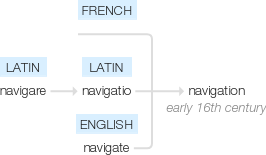Navigation
early 16th century (denoting travel on water): from French, or from Latin navigatio(n- ), from the verb navigare (see navigate).
wiktionary
Borrowed from Middle French navigation, from Latin nāvigātiōnem, accusative singular of nāvigātiō(“sailing, navigation”), from nāvigātus, perfect passive participle of nāvigō(“sail”). Morphologically navigate + -ion
etymonline
navigation (n.)
1530s, "act of moving on water in ships or other vessels," from French navigation (14c.) or directly from Latin navigationem (nominative navigatio) "a sailing, navigation, voyage," noun of action from past-participle stem of navigare "to sail, sail over, go by sea, steer a ship," from navis "ship" (from PIE root *nau- "boat") + root of agere "to set in motion, drive, drive forward" (from PIE root *ag- "to drive, draw out or forth, move"). Meaning "science or art of directing the course of vessels as they sail" is from 1550s.
The management of the sails, etc., the holding of the assigned course by proper steering, and the working of the ship generally pertain rather to seamanship, though necessary to successful navigation. The two fundamental problems of navigation are the determination of the ship's position at a given moment, and the decision of the most advantageous course to be steered in order to reach a given point. [Century Dictionary]
